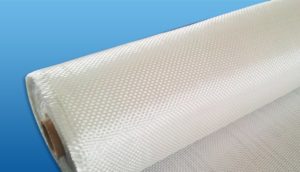Fiberglass fabric or cloth, with C and E Glass, is woven in various configurations from five basic weave patterns, called plain, leno, satin, twill and basket. Fiberglass cloth is a strong and durable woven textile used mainly for industrial applications.  Fiberglass fabric’s unique valuable properties makes it ideal for many industrial uses, such as for the interiors of circuit boards, conveyor belts and vehicles. Light-weight cloths also provide a smooth finish and are ideal for producing a waterproof layer over wood or other surfaces, such as is needed in boat repair and other marine applications.
Fiberglass fabric’s unique valuable properties makes it ideal for many industrial uses, such as for the interiors of circuit boards, conveyor belts and vehicles. Light-weight cloths also provide a smooth finish and are ideal for producing a waterproof layer over wood or other surfaces, such as is needed in boat repair and other marine applications.
Perhaps the most notable quality of fiberglass cloth itself is its high tolerance of extreme heat. It not only dissipates radiant heat with remarkable efficiency, but some types of cloth can withstand temperatures of up to 1648 degrees C for as long as a minute. Another notable attribute of fiberglass fabric is its high tensile strength. At a much lower weight and cost, it has a greater tensile strength than steel wire of similar diameter. Fiberglass fabric has excellent dimensional stability as well, meaning that fiberglass fabric stretches only very minimally under stress- usually about 3 percent or less. Like glass itself, fiberglass is highly resistant to most harsh industrial chemicals.
Meanwhile, fiberglass fabric can be combined with coatings on the surface to meet specific requirements for extensive applications such as thermal insulation, fire resistance, welding protection etc.
Oddly enough, despite its resilience and resistance to almost every possible type of industrial hazard, it is important that fiberglass cloth be rolled onto a tube for shipment, and not folded, regardless of how large or small the order may be. Folding it for shipment can damage the cloth where it is creased. If this one precaution is followed, the structural integrity of the fabric will be preserved to provide strength or protection in whatever context it is needed for.

